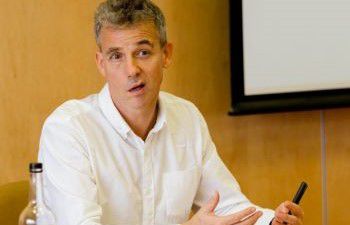Five minutes with Matias Ramirez: “My work encourages system change around sustainability”
Posted on behalf of: University of Sussex
Last updated: Thursday, 10 July 2025

Dr Matias Ramirez is a Reader in Science, Technology and Innovation and Development within the Science Policy Research Unit (SPRU) in the Business School. His research focuses on transformative innovation, which aims to tackle complex societal challenges and drive positive change.
Matias won the award for Global Engagement as a member of the Transformative Innovation Policy Consortium (TIPC) at the Sussex Awards 2025. Find out more about his reflections on teaching Sussex students, how his research has impact - and also who has had a big impact on him.
The University attracts some very motivated students from all around the world who are keen to engage with issues such as sustainability and making the world a better place. That always makes teaching and interacting with students very motivating.
TIPC brings together academics and policymakers from science, technology and innovation (STI) agencies and other policy making and practitioner bodies from different countries to support and promote innovative policy approaches towards sustainability. Transformative innovation policy aims to reshape systems to address global challenges, such as inequality, climate change, health crises or biodiversity loss. It focuses on structural change through experimentation, collaboration and learning. TIPC was launched by SPRU in 2016 with initial member agencies in Scandinavia, South Africa and Colombia. It expanded to form hubs in South Africa and Latin America in 2020 and more recently in Europe, involving more local academics and policymakers and adapting some of the approaches to local contexts. As well as developing policy experimentation for transformations and encouraging system change around sustainability, TIPC has also established a resource lab, which is an extensive toolbox of resources and guidance to help policymakers and researchers implement transformative innovation.
My research has focused on Latin America since TIPC was established. I’ve published papers on the role of social movements in transformations, transforming the research system towards meeting the UN Sustainable Development Goals based on a study of Mexico, and how to achieve international policy transfer for transformation. Our most important TIPC projects have been initially in Colombia. We helped the national STI agency write a policy for how science, technology and innovation could meet the UN Sustainable Development Goals. This became a national policy known as the Green Book. More recently, SENACYT, the Panamanian agency for STI has joined TIPC and made a significant investment in adopting methods for sustainable transitions. Another major project is with the Wyss Academy for Nature in the Peruvian Amazon where we’re working with local communities to develop a pathway to decrease deforestation. These major policy initiatives have helped to change the narrative of science, technology and innovation policy toward sustainable transitions in the region.
Academics can actually help make real changes on the ground if they get involved in grassroots activities. In one of my papers on social movements in defence of the wetlands in the city of Bogota in Colombia, my co-authors and I found that local academics were the key intermediaries that allowed funds from policy to be channelled towards the defence of wetlands. In terms of the work I have done in the Amazon, I found that the deforestation tipping point in the Amazon is somewhere between 20% and 30%. This means that if deforestation reaches this point, the forest transitions into savannah with cascading impacts on rainfall climate carbon storage and biodiversity. This is very worrying because since the 1960s, between 17% to 20% of the entire original Amazon forest cover across the entire biome has been lost.
I am a keen kayaker and a member of a kayak club in Brighton where we go on the sea, on local rivers and sometimes wild water kayaking. It definitely makes me switch off in a good way! I also have an allotment where I grow vegetables and am now getting into flower growing. Having a beer with my friends is also great way to relax.
I think my son has had a big impact on my life, particularly when he was young. I had to stop just thinking about work when I was with him and learn to completely dedicate myself to him. That taught me to slow down, understand what the concept of care means and be more generous and mature as a person.
